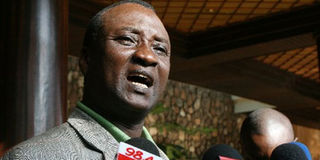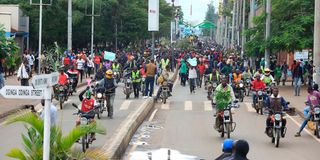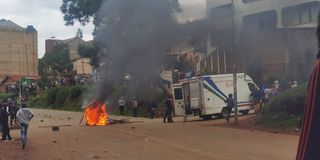
Ugenya MP James Orengo addressing Saba Saba rally in Nairobi in 1999.
As the country marks 35 years since the inaugural Saba Saba pro-reform protests on July 7, 1990, leaders who led the struggle say it was impactful as they support another planned round of Gen Z protests tomorrow.
The Second Liberation luminaries cite the removal of Section 2A that ushered in the return to multiparty democracy and the eventual realisation of the current Constitution as important gains of their struggle.
“We ended the one-party governance system by having Section 2A of the old Constitution repealed; we forced the limitation of the presidential term of office to two and, most importantly, we laid the foundation for the realisation of the vision of the 2010 Constitution. Therefore, I would not characterise (the original) Saba Saba as a failure,” says lawyer Gitobu Imanyara in an interview with the Weekly Review.

Imenti Central Member of Parliament Gitobu Imanyara. Photo/FILE
The Imenti Central Member of Parliament was among the so-called Young Turks of the Second Liberation who defied President Daniel Moi and trooped to a political rally at Kamukunji Grounds on July 7, 1990.
Others were Raila Odinga, Mukhisa Kituyi, Paul Muite, James Orengo, Njeru Kathangu, and Kiraitu Murungi, who joined the then old guards— Martin Shikuku and Masinde Muliro — to lead the rally. This was after the conveners, Kenneth Matiba and Charles Rubia, were arrested three days before the rally was declared illegal.

Opposition leaders heading to Kamukunji Grounds July 7, 1990.
The pro-reform advocates got support from fiery religious leaders such as Ndingi Mwana a’Nzeki (Catholic Church), Rev Timothy Njoya of PCEA, and Anglican Church bishops David Gitari, Henry Okullu, and Alexander Kipsang’ Muge, who also challenged Daniel Moi’s autocratic rule.
At least 20 people are reported to have died in the protests, which left many injured. As a result, the Kanu government bowed to pressure and allowed political pluralism in 1991.
But today, Imanyara, Rev Njoya, Muite, Wafula Buke, and others, who participated in the Saba Saba uprising, blame the current administration for watering down the gains of the movement by limiting civil rights.
“The deepening crisis of abduction, enforced disappearances, extrajudicial killings, and violent arrests of government critics—more so young people—is a testament that this government does not respect the fundamental rights and freedoms of the people as enshrined in the Bill of Rights in the Constitution,” says Rev Njoya.
He is opposed to the proposed Public Order (Amendment) Bill, 2025, saying it is unconstitutional and should be rejected by MPs and all Kenyans.
“The Bill of Rights gives every person the right to peaceably and unarmed, assemble, demonstrate, picket, and present petitions to public authorities. This right should not be taken away by anybody through such legislation,” he explains.
The retired PCEA cleric, who was physically assaulted by pro-government goons in the 1990s, supports the Gen Z uprising, saying they are fighting for a better future for this country and the fruits of the liberation movement.
“They are fighting for jobs, better healthcare, proper use of public funds, and an end to corruption and misuse of resources. All they want is progress, and I support them very much,” says Rev Njoya.
Imanyara shares the same view, referring to the Gen Z uprising as “the fruits of the seeds we planted.”
“They have already been even more impactful than us in the 1990s. They forced the President to perform the unprecedented task of withdrawing a Finance Bill Parliament had already rubber-stamped, awaiting presidential assent. They forced the dissolution of the Cabinet.
“They even forced the President to offer an apology, even if half-hearted. For the first time since the coup attempt of 1982, the military was called to the streets,” explains the lawyer.
Are the former reform crusaders planning to join the Gen Zs on the streets tomorrow to mark the 35th Saba Saba anniversary?

Residents march into town along Jomo Kenyatta Highway in during Saba Saba protests in Kisumu City Centre on July 7, 2023. Two people died during the protests.
“We have no planned get-together of the Young Turks of the Second Liberation because some of us have been co-opted into government. But we support the cause the youthful Kenyans are fighting for,” says Imanyara, referring to Mr Odinga, whose party ODM is a partner in Dr Ruto’s broad-based government.
But Buke told Weekly Review that he will join the Gen Z protest tomorrow because the government has failed to stop abductions.
“As we speak, I am in Bungoma. But on Monday (July 7), I will be in Nairobi to join the Saba Saba protest because nothing has changed, even after our comrade Raila Odinga decided to work with the Kenya Kwanza government, promising to end human rights violations like abduction, forced disappearances, and extrajudicial killings,” he said.
The former University of Nairobi student leader and political detainee said he participated in the June 25 demonstration in Nairobi that was called to mark one year since the killings witnessed during last year’s youth-led protest against tax hikes and bad governance.
Data from the Kenya National Commission on Human Rights (KNCHR) shows that at least 60 people were killed, 85 abducted, and 29 still missing during nationwide protests that occurred from June 18 to July 1, 2024.
In addition, the state’s human rights defender has documented 19 deaths from last month’s round of protests.

Protesters barricade the Kisii-Kisumu road on Friday, July 7 during the Saba Saba anti-government protests.
On June 17, Buke and fellow former political prisoners called on Odinga to disengage from the Kenya Kwanza government for failing to implement the 10-point agenda in the partnership agreement he signed with the President on March 7, 2025, in Nairobi.
They claimed that the Kenya Kwanza administration remains in power by virtue of being supported by Odinga’s opposition party, ODM.
“It is our duty to appeal to comrades who are working with the Ruto administration to basically disengage and give Kenyans a chance to choose a new administration. The Ruto administration is left in office because ODM supports it,” Buke said at a press conference in Nairobi.
Additionally, former detainees said that at least those who were put behind bars were relatively safer during their time, unlike now when Gen Zs are abducted and killed.
“While the administrations of presidents Kenyatta (Jomo) and Moi (Daniel) mainly targeted leaders, this current regime targets young people. More young people have been killed. This regime is killing the future,” the former detainees said,as they called for a public judicial inquiry into the rising abductions, torture, and extrajudicial executions across the country.
Others who attended the press conference are; Edward Oyugi, Ngotho Kariuki, Gakuo wa Maina, Kiongo Mama, Oginga Kawino, Oduor Ong’wen, Oginga Ogego, and Kamonye Manje.
Former Runyenjes MP Njeru Gathangu urged the regime to listen to the demands of young people.
Meanwhile, a civil society group, the National Alternative Alliance wants rallied Kenyans to commemorate Saba Saba Day.
“Young people are creators of ideas. They are the heartbeat of the nation as far as change is concerned. You can get ideas from the young people on how to move the country forward,” he said on Friday on the “Fixing the Nation” morning programme on NTV.
“Therefore, if the young people tell you they want this, please listen and do accordingly,” added Mr Kathangu, cryptically directing his message to President Ruto.
The former Ford Asili Secretary General, popularly known as “Mtumishi,” said Kenya is an important country in the world, and it behoves the current administration to listen to the grievances of the bulk of its population—the youth.
But Mr Kathangu implored the Gen Zs to come up with a leadership to give them direction.
“They should stop being leaderless. If they fear that their leader will be bought, they are as good as lacking resolve and determination,” he said, adding that he will not come out to the streets on Monday but will give moral support.
Meanwhile, a civil society group, the National Alternative Alliance (NAA), said they are planning to rally Kenyans to commemorate Saba Saba Day on July 7, 2025.
Led by their national convener, Arnold Maliba, and politician Kennedy Ondiek, the lobby said they aim to pressure Ruto to listen to grievances raised by Kenyans.
Additional reporting by Kevin Cheruiyot





